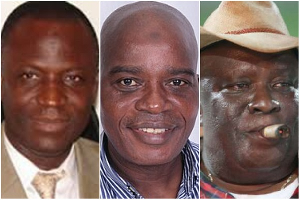By Bernard Asubonteng, Atlanta, GA.
Back in the days and even as of now, many soccer fans worldwide, especially in Africa, get scared to death at the mere mention of Brazil, Argentina, France, Italy, England, and others often referred to as soccer powerhouses. Although the “fear perception” among most of these Africa soccer nations (in particular) is dying down lately, still an aura of mystery with its attendant air of invincibility keep blowing around these over-rated big teams.
So, whenever an African national team or a so-called “small team” is paired with her counterpart from South America or Europe in a soccer contest, the former starts behaving like a scared cat even before the game begins. A good example was Ghana vs. Brazil in 2006 FIFA World Cup held in Germany. Throughout the game it became obvious that most, if not all of the Ghanaian players were too nervous and hence lethargic around their Brazilian counterparts. No doubt there were traces of inferiority complexes buried deep in the Ghanaians’ mindset that Brazil of all soccer nations could not be defeated by a World Cup debutant, such as Ghana.
In view of these defeatist tendencies, it’s no surprising teams such as Brazil, Argentina, Italy, France, and so on always view themselves as favorites to win in any soccer encounter involving an African team or a team from “unseeded” football nation. The reason is not because talent-for-talent Italian or Brazilian players are superior to their African contemporaries. Indeed, the reason has a lot to do with most of Africa soccer planners’ mediocre utilization and organization of the continent’s immense soccer talents and resources, including their lack of high-level psychological tutelage for the up and coming African footballers.
No one is implying that countries such as France, Germany, Brazil, Spain, and the like can be run over easily with a well-rehearsed psychological strategies. We know that these nations are well-versed in the game of football psychology, besides their elaborate preparations and the state-of-the-art sports infrastructures their respective cities and towns have built to support soccer development. However, one can argue that psychological factors probably play a greater part in explaining why these over-rated soccer teams from South America or Europe evoke fears in their opponents from the “low-seeded” soccer countries.
The point here is that modern football is like a war between two nations. It does not matter how militarily powerful a nation is, contemporary wars are not fought and won in the battlefield only; rather, psychological warfare, propaganda tactics, and other behind-the-scenes strategies all play crucial roles in winning military battles. In other words, in highly competitive soccer contest, psychology is an indispensable winning commodity. In fact some of us can argue otherwise, yet the reality still remains that in contemporary football without adequate psychological reinvigoration and reinforcement, the players become overwhelmed with nervousness thereby losing focus, concentration, and creativity on the playing field. This on-and-off-the-field complexes seem to be the major drawbacks holding African soccer hostage as the continent is boldly trying to engrave her lasting image on the world soccer stage.
It may interest many soccer enthusiasts to know that Brazil did not become a world-class football nation in a vacuum. In other words, they didn’t reach their current level through fears and haphazard approaches to soccer planning. In fact, Brazil has hosted the FIFA World Cup once in her football history in 1950 where the country built what was considered to be the world’s biggest soccer stadium--Maracana--with the capacity of nearly 200,000. Yet, Brazil could not win the Cup. Uruguay beat the host in front of a capacity crowd to become the world champions for the second time. Since that memorable disappointment, the Brazilians quickly readjusted and adopted some useful lessons regarding their approach to soccer: a well-coordinated training, self-discipline, and above all, self-confidence in their abilities. Self-confidence in this context is defined as having an attitude or a deep-seated mindset that no one is better or superior to you as a human being, including your God-given capabilities. It also means that you can accomplish anything you set your mind on to do as long as you stay focused, work extra hard, and rid all fears from your pathways as you embark on your endeavors.
This brings us back to the few years following the 1950 debacle; Brazil started shaking off all the vestiges of inferiority and nervousness from its soccer universe. As a result, in 1958 in far away Sweden, the samba boys won their first World Cup; they defended it the Cup in 1962. No matter who they playing, when the Brazilians step on to the field they always have a winning mentality and the high hopes that the match is theirs to lose. Not only do they regard themselves as favorites all the time but also many people outside Brazil do, too. That is why whenever they lose a match many soccer pundits and fans alike characterize the outcome as an “upset,” even though I personally do not know what that WORD means that context.
At any rate, this upset-cum-favorite phenomenon underscores the importance and the psychological urgencies that has come to form an integral part of modern soccer. Far from discounting the importance of up-to-date training equipment, world-class stadiums, and the development of youth sports, Brazil is a major force in soccer because it’s highly motivated psychologically. Yes, rigorous training counts; but, in a highly-tensed football matches in this age, the team that exudes high-level confidence and focus throughout the duration of the game always wins or has a better results. Besides their skills and athleticism, the Brazil team is not scared of no other team; and, that is their trump card regarding their philosophy in soccer.
I’ve deliberately dwelt on Brazil extensively just to make a point, because for one thing their style of football commands a large following in Africa and beyond. For another thing, too, the Brazilian national team has come to embody self-confidence in modern-day soccer. But bear in mind that throughout this discourse the recurring subtext has been that irrespective of how powerful and successful a soccer team is, we all know that every soccer team is made of eleven human beings--nothing more, nothing less. So, if your team happens to encounter any of the so-called soccer giants, no matter the odds and all the media hypes, you also have to see your team from the prism of equality. Stated differently, playing against a team such Argentina, Brazil, Italy, or Spain is not the equal to playing against a team sent from the planet Jupiter! Once you have it at the back of your mind that your opponent is beatable just like any other team made of human beings, then half of the battle is already won.
If anything at all, an unvarnished confidence, including a steel-like determination exhibited by Ghana U-20 soccer team should be an eye-opener to all African teams going to the 2010 World Cup in South Africa. Watching the Ghanaian team played in the U-20 World Cup held in Egypt recently, it was clear that the eventual winners, Ghana, were highly confident and psychologically on par with, if not above the other contestants. Thus, in addition to their individual skills and team cohesion, fear was not on the Ghanaian team’s radar screen. Say what you want, unlike their senior counterparts (Black Stars), the Ghanaian U-20 side were unfazed playing against the Brazilian U-20. After all Ghana overrun them with 10-man team and lifted the Cup!
“Yea…Ghana was lucky because Brazil played better than them.” I heard a lot of people, some Ghanaians included, making that defeatist and flawed argument. The response to those puny reasoning is: so what? Who won the 2009 U-20 Cup? I don’t claim to be a linguist or a philosopher, but If I were asked to deconstruct or analyze the conceptual structure of the word LUCK, I’II definitely come out with countless interpretations and meanings. Many of you may come up with different definitions of luck, too. Luck as a concept or a phenomenon is both elusive and infinite. If Ghana’s success was based on luck, as some people claimed, why couldn’t they score during the regular playing time since all the “luck” was supposedly on Ghana’s side? Could it be implied then that there was an unseen hand(s) that was holding back Brazil’s luck? Let’s all try to reason with some sense, folks. Ghana U-20 won against one of the so-called soccer powerhouses via sheer determination, self-confidence, self-discipline, and a game plan. Trying to diminish the boys’ effort is a big disservice to the spirit of soccer
Finally, the 2010 World Cup fixture drawings have just taken place on Friday, December 4, 2009 in South Africa. All the 32 nations now know the group they belong and the teams they will be playing against come June 2010. As usual the self-proclaimed soccer pundits and the media are picking their favorites and predicting winners. It’s irrelevant to these arm-chair analysts that soccer has undergone dramatic metamorphoses for the past decades. All they talk about are the so-called football giants, the FIFA-chosen teams, the soccer powerhouses made of Argentina, Brazil, Italy, Spain, England, France, and Netherlands.
That is the game they’ve been playing off the field for years to put some fears in the “not-too-powerful” teams so by the time you meet, say, England or Argentina, you are already frozen to your bare bones. Folks, the psychological warfare in soccer is already in high gear till after the World Cup finals in July 2010. During this mind game period, the self-styled football experts in Europe, South America, the U.S., and even some of the timid Africa media will keep telling us over and over again how super, super talented Messi, Ronaldo or KaKa is. Truly, these players are skillful, but as a student of mass communication, I know firsthand how the media can be used to create a “God” out of a mere mortal human being.
As I discussed earlier, Ronaldo, Kaka, Messi or Torres are all humans made up of bones just like Drogba, Essien, and E’to and other talented African players. So while the Western media are following their normal news pattern, projecting winners and extolling some players as if they’re larger than life, my advice to the so-called unseeded teams going to the World Cup is simple: prepare for self-confidence, prepare for self-discipline, prepare psychologically and physically, and I promise not only will the sky be the limit, but also we shall begin to witness the mystery surrounding these so-called soccer powerhouses demystified.
Contact: Bernard.asubonteng@yahoo.com
Sports Features of Sunday, 6 December 2009
Source: Asubonteng, Bernard












